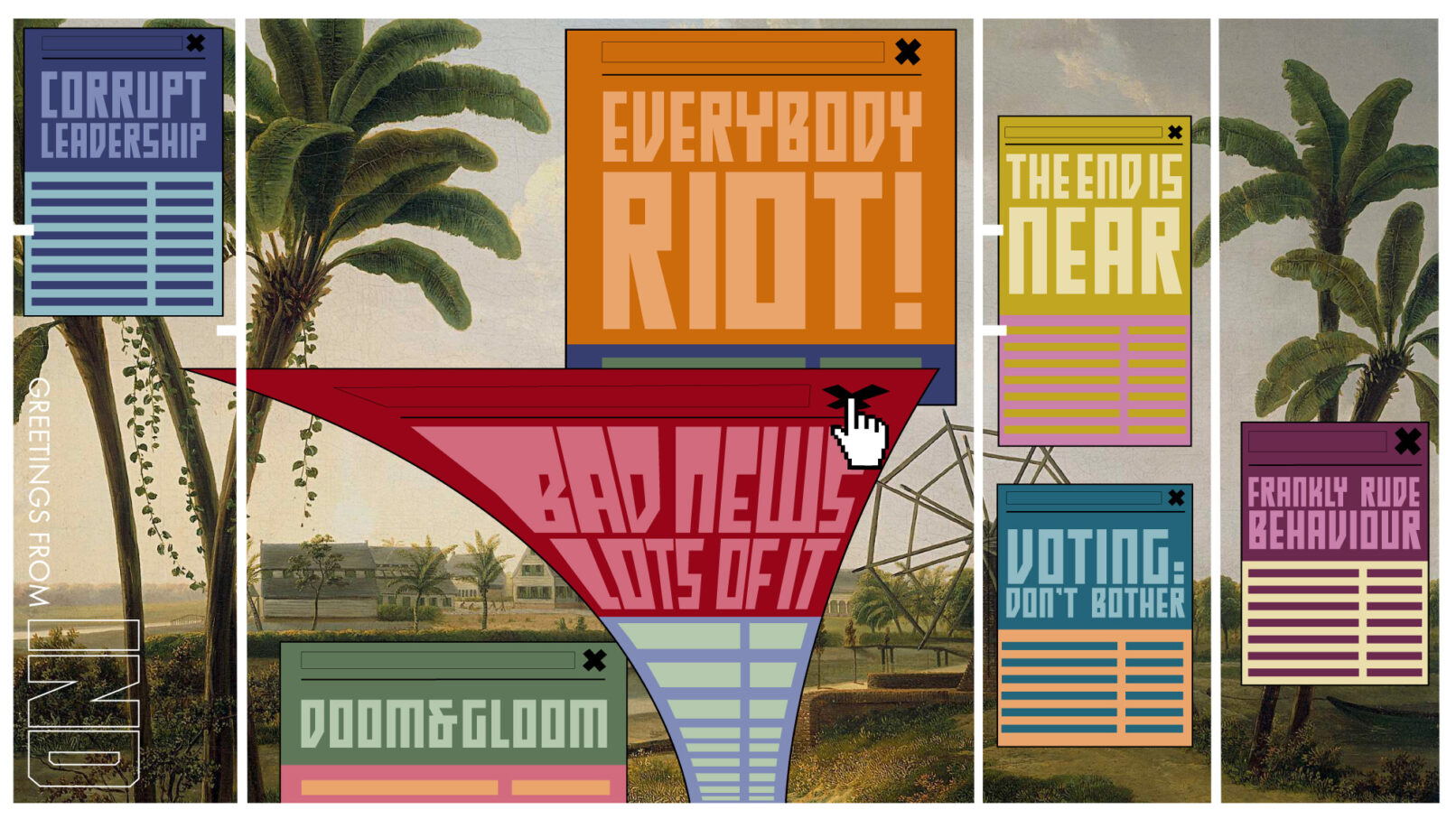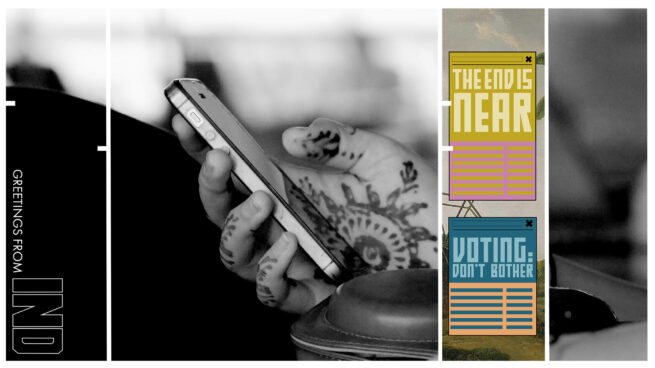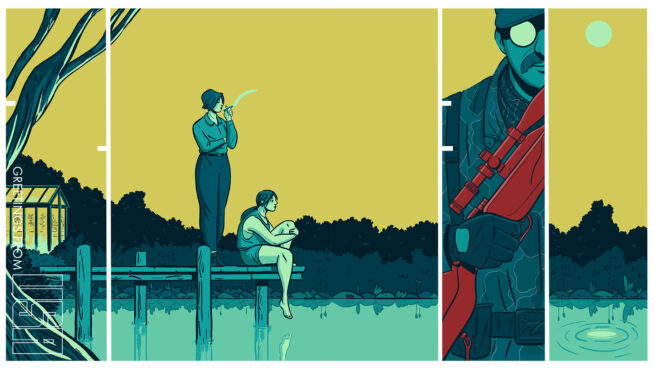This is the story of your relationship with the perfect cup of coffee.
Your Cup Runneth Over
By Lavanya Lakshminarayan
It starts long before that rainy Tuesday morning when you rushed into the local Coffee Day.
You hurriedly turn on the flash-dry feature on your hoodie. The smart-fabric hisses, steam rises from your shoulders, and you eye the holographic menu attempting to pick between a pedestrian cappuccino and a mediocre café au lait. A banner ad spins before you, showing you a beautiful rental villa at a coffee estate in Chikmagalur, complete with a private pool and a personal concierge service.
“I hear music,” your best friend says over your in-ear headphones.
“At the local Coffee Day,” you mumble. “I need caffeine to power through my meetings. I’m so stressed.”
“Huh, no Starbucks?”
“You know I’ve been supporting local businesses ever since that news article I read —”
“Mmm. You take too much responsibility. You need a break.”
“No time,” you say, a spike of anxiety pressing against the insides of your skull. “I have seven minutes to this first meeting. Talk later.”
You’re next in line to order. Just as you settle on getting a double espresso, a holographic banner unfurls to the sound of fanfare and announces that the cappuccino is at 50 percent off.
“Cappuccino it is,” you decide. Your server holds a health-scanner up to your wristband to determine how much sugar you’re permitted to consume.
“No sugar, double espresso shot,” you clarify.
The health-scanner beeps and switches to monitoring your seven-day heart-rate trend. You hold your breath in the three seconds it takes to turn green, indicating that you’re good to go.
Two minutes later, you’re checking out listicles. Your off-brand smartglasses are somewhat out of sync with your irises as you scroll, but over 3,000 reviews on Amazon said they offered the best value for money. At 50 percent the cost and with twice the warranty period, they’re a steal, even if they occasionally give you a headache. You pretend to make eye contact with your supervisor over video, simultaneously texting your mother who’s tried to call you six times this morning.
Can’t talk, at work, super busy and stressed, you shoot off.
You’re oblivious to the role you play on this planet, but it’s an important one.
An advert bubbles up in the space above your manager’s perfectly shaped eyebrows. Flight tickets to an exclusive scuba-diving course in the Andamans are on sale. “Catch the coral in action before the bleach does!” You dismiss the notification from your phone.
Overdue vacation? your mother states the obvious.
Duh. No time.
You try not to roll your eyes. Your supervisor is staring at you in an ever-deepening silence, and you realize she’s asked you a question. You have no idea what it was. This is not going well.
“Your attentiveness is dropping,” she says. “70 basis points down in the past three days. Including during meetings with our clients.”
She’s probably looking through a graph documenting the activity on your smartglasses -multitasking is frowned upon in a world where entertainment is the blink of an eye away. You try and explain that your clients’ absurd requests aren’t worth listening to in the first place. The last one tried to convince you to incorporate his pet kitten into his marketing graphics. He runs an up-and-coming vegan burger chain.
“You know how hard it is to convince most people here that things made from soy protein and tofu are actually vegetarian. A cat’s face on a burger!” you laugh.
Your supervisor begins to lecture you about tact. She tells you this is the eleventh time this quarter you’ve displayed none. For the first time ever, you’re thrown out of a coffee shop for raising your voice, further proving your supervisor right.
This is going to look bad on your mental health record. A calendar invite for a virtual appointment has already been sent to you from your therapist’s office. Your supervisor gives you the day off. You file for three days off, instead. You’ll take the pay cut for last-minute notice. You’re pleased with the impulsive nature of your decision.
Unknown to you, you’ve used the word ‘stressed’ 17 times in conversation in the last three weeks. Owing to this trend, you’ve seen at least six advertisements for exotic vacation destinations in a 500-kilometre radius over the last three days, all at a price point based on your spend patterns over the last 12 months.
You decide to drive down to Chikmagalur, to a luxury coffee estate right on the outskirts of Bangalore. Your rental car is delivered late. The driver is most apologetic.
“Rallies,” he says, handing you the keys. “A candlelight vigil protesting violence against women—”
You don’t need to hear more. In fact, this reminds you to secure your cocoon of isolation. You turn your reality filters all the way up on your social media feeds, making sure no news from the real world leaks its way through your phone and onto your smartglasses. Nothing can disturb your utopian de-stressing regimen this weekend.
Your triggers include communal violence, violence against women, violence against lower castes, crimes against queer identities, and everything to do with the upcoming election, where power-hungry zealots are bound to take to their milk-crates and incite voters to action based on threats and empty promises. You’re guilty at the thought of taking time off from protesting injustice on your social media handles, but you don’t threaten the system. Statistically, given the number of followers you have on Twitter, and the ratio of your political posts to your posts about bespoke cocktails, you’re practically off the grid.
You were hoping to listen to some ’80’s metal on your way to the resort, to lend voice to the frustration that’s been building in you over the months. Your access to YouTube and Spotify has been blocked by the National Health and Well-Being Programme. You mutter curse words at the therapist-approved Bach streaming through your earphones before becoming one with the woodwinds in his Brandenburg Concerto No. 2. The stats on your smartglasses show that listening to the second movement lowers cortisol levels by 0.7% each time.
The first thing you do at the resort is pour yourself a glass of wine from a bottle of vintage that’s been given a five-star rating by 78 percent of the guests who’ve stayed there. The scent of your bubblebath has been determined by the hotel’s guest-preferences system after analyzing the ingredients in your bespoke cocktails, your purchase history of essential oils on Amazon, and your predilection for booking aromatherapy massages. The specific algorithms through which they’ve inferred that it’s lavender are inconsequential to you.
While you unwind in the tub, you take a Virtual Reality tour of the coffee estate via your smart glasses. Bright red berries, ripe to burst, press against the edges of your peripheral vision, and you imagine that you can feel them rolling off your cheeks and down your skin into the temperature-controlled water. The scent of lavender is no longer enough, and the wine tastes like copper upon your tongue.
Just then, the hotel concierge pops up on your smartglasses with an invitation to a coffee-tasting tour the next morning. They’ve listened in on the muzak you’ve been streaming from your therapist-approved ambient playlist, and while they aren’t watching you soap yourself clean, they’re tracking your water consumption patterns and your video viewing history. They’ve hosted enough guests to have established trendlines telling them what’s likely to appeal to you next.
You tweet about your coffee-tasting tour the next morning. You try four local brews and settle on a locally produced blend of arabica as your new favourite coffee. All your 716 followers applaud your discovery. The array of coffee cups and happy farmers on your Instagram sets an all-time high for likes and impressions – 81! This has been a vacation well-spent. You don’t even mind returning to smoggy, traffic-clogged Bangalore and trudging through the slew of emails in your inbox again.
Your therapist’s algorithm has now enabled access to pop music from the ‘90’s, and you start the day singing along to NSYNC and the Spice Girls. Soon, you’re swearing out loud as you crawl through the densely-packed streets of Bangalore. Your phone is listening in on every choice confabulation of cuss word, making note of every slur that refers to a political party or a powerful celebrity. Your wristband is switched back from its vacation-mode setting, and you no longer have a free pass on sugar and caffeine. You’ve lowered your reality filters, and the injustice of the world hits you full in the face. Home again, you’re about to take to your social media handles in protest over a corruption scandal when an advert pops up, hovering holographically in the air above your phone.
You make the perfect brew, thrilled by your discovery of a genuinely local product.
Chikmagalur Amazing Arabica! it proclaims. The sight of a coffee cup — the very same coffee cup you posted on your Instagram — evokes the scents of lavender and coffee beans, the subtle sounds of trilling birds and the whispering wind. You tap on it. You can subscribe to a weekly supply, for an entire year, at a fraction of the cost of the subpar cappuccinos at Coffee Day. You’re going even more local by supporting local farmers instead of a local coffee shop chain. You’re wrapped in the warmth of righteousness when your first package is delivered within the hour. You make the perfect brew, thrilled by your discovery of a genuinely local product.
In the last five months, you passively walked past 25 holographic adverts and public service announcements that read ‘Support Local Businesses’, scrolled past hundreds of tweets hashtagged ‘Go Local’. 706 impressions later, you’ve swallowed the idea of the inherent wholesomeness of local enterprise as wholly as you’re about to consume that brew before you.
You’re oblivious to the role you play on this planet, but it’s an important one. You’re a grain of sand on this massive subcontinent, being knit together with other specks of humanity like you. You’re being spun into a perfect sphere of glass. Transparent, empty and practically invisible. Beautiful and easy to shatter if required.
Go on, then. Take a sip of that perfect cup of coffee. You’ve earned it.
Lavanya Lakshminarayan is the author of Analog/ Virtual: And Other Simulations of Your Future. She’s the winner of the Times of India AutHer Award for Best Debut Novel and a Locus Award finalist. She has also been nominated for the BSFA and Valley of Words awards. Her short fiction has appeared in various anthologies, including The Gollancz Book of South Asian Science Fiction: Vol. 2. She’s occasionally a game designer, and has built worlds for Zynga Inc.’s FarmVille franchise, Mafia Wars, and other games. She lives in India and is currently working on her second novel. You can follow her on Twitter and Instagram.
Eden Brackenbury is a designer and producer from Indiana, based in Brighton. She makes illustrations and animations for Storythings and our clients and looks after our websites and freelancers. She was the lead designer on Nevertheless Season 2, Public Media Stack and History of Drag.



